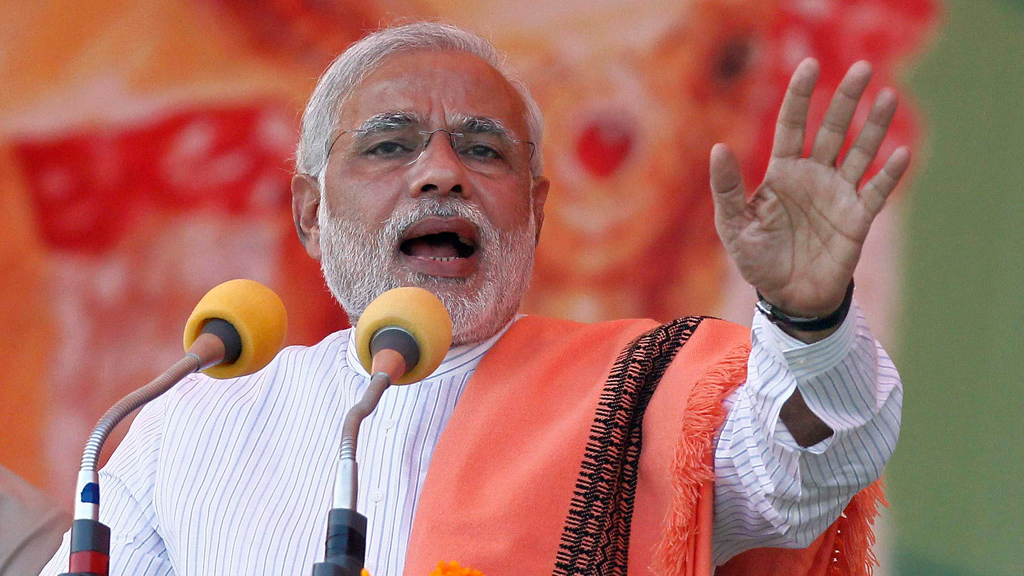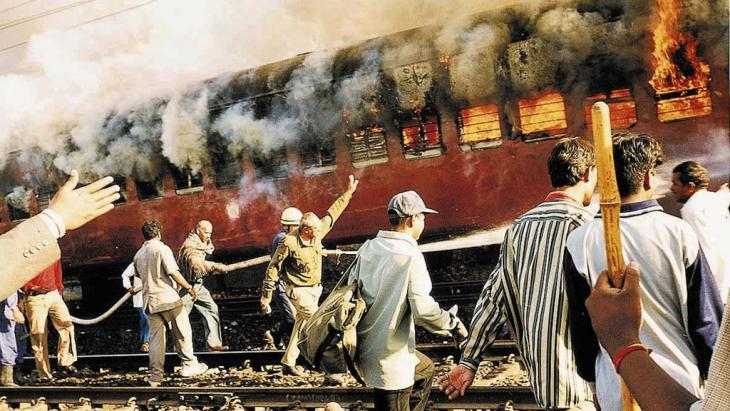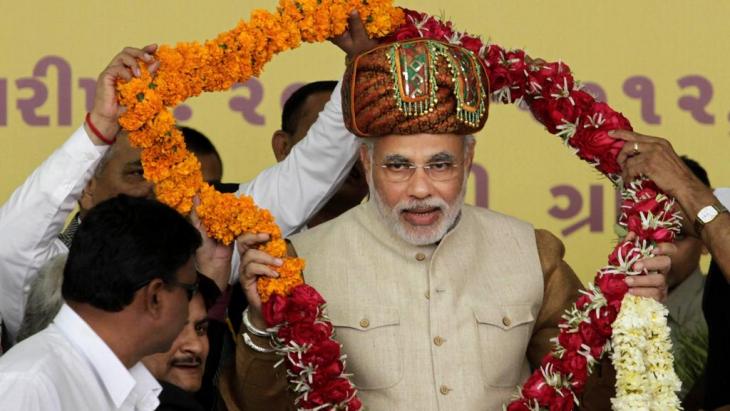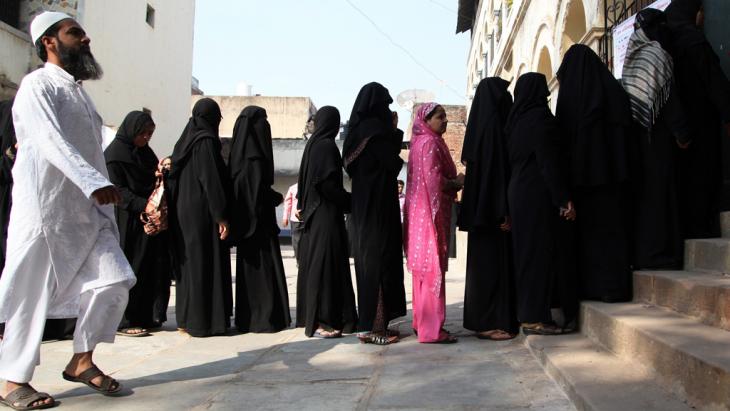Divisive figure could become India's next PM

On 27 February 2002, a dispute broke out between Hindu pilgrims and Muslim residents at the Godhra railway station in the Indian state of Gujarat. In the course of this dispute, fire broke out on a train, killing 59 Hindus.
Although there were indications that the fight erupted spontaneously, Gujarat's Chief Minister Narendra Modi referred to the Muslims involved as "terrorists" and glorified the dead Hindu pilgrims as martyrs. According to later reports, he gave orders at a cabinet meeting that evening for no action to be taken in the event of counter-attacks against Muslims.
In the days and weeks that followed, targeted attacks by Hindu nationalist groups on the Muslim minority took over 2,000 lives – according to human rights groups, the vast majority of them Muslim. Later investigations showed that the pogroms had been planned well in advance and that the Godhra tragedy had simply provided a pretext for putting the plans into action. It was also revealed that the violence had been fanned and directed by politicians from Modi's Hindu nationalist Bharatiya Janati Party (BJP).

Threat of further confrontation
Today, 12 years later, Modi is the BJP's candidate for the post of prime minister in India's general election. The BJP has a good chance of emerging from the May elections as the strongest party. Modi would then become prime minister of India.
Would this mean a further worsening of the already tense relations between Hindus and Muslims? And possibly renewed violence? Many Muslims and independent observers are alarmed. But Christian Wagner, India expert at the German Institute for International and Security Affairs (SWP) in Berlin counsels restraint.
"The BJP's decision to back Modi is very clearly motivated by his economic achievements," says Wagner. Modi was chosen as front-runner because he is regarded as an honest and efficient administrator, having steered his state to greater prosperity with his liberal economic course.
Wagner believes that in order to win votes outside the traditional BJP electorate, Modi will emphasise in his campaign the need to fight corruption, promote the economy and ensure good governance.
"This is a significant difference from the BJP campaigns of the 1980s and 90s, when the focus was on the Hindu-nationalist element," notes Wagner. Although this strategy contributed back then to the rise of the BJP, the party has in the meantime realised that it is not conducive to obtaining more than 30 per cent of the vote at national level. In Wagner's opinion, the BJP's original plan to mobilise the Hindu masses through the Hindutva ideology – and thus achieve a majority – has failed.

The ideology of Hindutva is an exclusivist form of cultural nationalism that has its origins in the 1920s. According to this ideology, India is the land of the Hindus, and there is no place there for minorities such as Muslims or Christians. However, the BJP and the other organisations of the Hindutva movement define Hinduism more in terms of culture than religion. The problem with this is that the Hindus, divided as they are into various castes and cults, do not constitute a unified culture.
In order to sharpen the Hindu sense of identity and cohesion, the Hindu nationalists therefore rely on discrimination against Muslims and other minorities. Particularly the volunteer paramilitary organisation Rashtriya Swayamsevak Sangh (RSS), which was founded in the 1920s and modelled on fascist organisations, repeatedly resorts to violence to assert this agenda. The RSS, where Modi long ago launched his career, also played a central role in the Gujarat pogroms.
To this day, the RSS and the BJP are still closely linked ideologically. They also have many members in common. "The RSS is important for the BJP as it represents the party's election machinery in many parts of the country. BJP candidates often do not have their own organisation and are dependent on co-operation with the local RSS cadres," says Wagner.
But the relationship is not always easy. "It's a problem for the BJP that it is unable to shake off this shadow and is incapable of distancing itself ideologically, and in particular organisationally, from the RSS," Wagner notes.
The dilemma facing the Hindu nationalists
The party thus faces a dilemma. "The BJP needs the Hindutva ideology to mobilise its own electorate, but it is also clear that – once they are in office – they won't be able to deliver," says Wagner. Ultimately, the BJP will have to rely on other parties to form a government, and they have made it quite clear that they will not support an aggressive Hindutva policy. According to Wagner, the BJP was able to allow itself to cater to such a policy in Gujarat, but not at national level, where it has to take the diversity of the country into account.

Nevertheless, Wagner would not rule out Modi's reliance on Hindutva wherever it seems tactically opportune to him to do so. There are already examples of this: when, in late October, on the same day Modi gave a speech in Patna, alleged Islamist terrorists killed ten people in a bombing, Modi had the ashes of the victims carried demonstratively through the city. And when in September a local dispute between Hindus and Muslims in Uttar Pradesh led to bloody riots that cost more than 40 lives, BJP politicians used rallies to further whip up emotions that were already running high.
Modi's rise is problematic for the West. Although no charges were ever brought against him, many human rights activists believe that he was complicit in the pogroms in Gujarat. After all, not only was he responsible for the police as chief minister, there was also evidence that the violence was fuelled by politicians of the BJP and organised by cadres of the RSS. For this reason, many European states shunned Modi after 2002. The US Administration even refused him entry into the country in 2005, bowing to pressure from Congress.
In view of Modi's economic achievements, however, the memory of the pogroms faded over time – helped along by his own efforts. No word of the violence is mentioned in his official CV, although at the time he was forced to resign because of it, after which new elections were held.
In recent months, the West has gradually come around. Following the example of several European ambassadors, the US Ambassador met Modi for the first time in mid-February. Modi is still denied a US visa, but should he become prime minister, that is bound to change.
Ulrich von Schwerin
© Qantara.de 2014
Translated from the German by Jennifer Taylor
Editor: Aingeal Flanagan/Qantara.de
